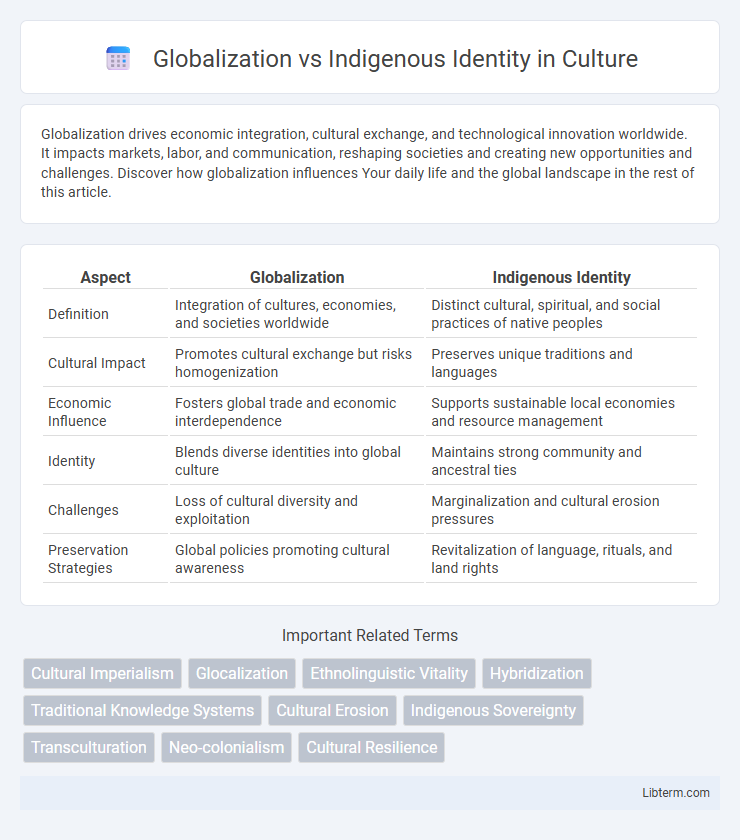Globalization drives economic integration, cultural exchange, and technological innovation worldwide. It impacts markets, labor, and communication, reshaping societies and creating new opportunities and challenges. Discover how globalization influences Your daily life and the global landscape in the rest of this article.
Table of Comparison
| Aspect | Globalization | Indigenous Identity |
|---|---|---|
| Definition | Integration of cultures, economies, and societies worldwide | Distinct cultural, spiritual, and social practices of native peoples |
| Cultural Impact | Promotes cultural exchange but risks homogenization | Preserves unique traditions and languages |
| Economic Influence | Fosters global trade and economic interdependence | Supports sustainable local economies and resource management |
| Identity | Blends diverse identities into global culture | Maintains strong community and ancestral ties |
| Challenges | Loss of cultural diversity and exploitation | Marginalization and cultural erosion pressures |
| Preservation Strategies | Global policies promoting cultural awareness | Revitalization of language, rituals, and land rights |
Introduction: Unpacking Globalization and Indigenous Identity
Globalization accelerates cultural exchange and economic integration, profoundly affecting indigenous identity by reshaping traditional practices and social structures. Indigenous communities face challenges preserving languages, customs, and self-determination amid dominant global narratives and market forces. The interaction between globalization and indigenous identity uncovers tensions between cultural homogenization and the resilience of localized heritage.
Historical Context: Indigenous Societies Pre-Globalization
Indigenous societies before globalization maintained distinct cultural practices, languages, and social structures deeply connected to their ancestral lands. These communities developed sustainable ways of living that reflected a profound understanding of local ecosystems and spiritual beliefs. Historical evidence from diverse regions highlights the resilience and adaptability of indigenous groups prior to the widespread influence of global trade and colonial expansion.
Cultural Erosion: Threats Posed by Globalization
Globalization accelerates cultural erosion by promoting homogenized media, consumer products, and languages, which threaten the preservation of indigenous identities. Indigenous communities face loss of traditional knowledge, rituals, and languages as global influences overshadow local customs. This cultural dilution undermines diversity, weakening the social cohesion and heritage that sustain indigenous peoples worldwide.
Language Loss and Preservation Efforts
Globalization accelerates language loss as dominant languages overshadow indigenous tongues, leading to diminished cultural heritage and identity. Efforts to preserve indigenous languages include community-driven revitalization programs, incorporation of native languages in education, and digital archiving initiatives. Protecting linguistic diversity is crucial for maintaining indigenous knowledge systems and fostering cultural resilience in a globalized world.
Economic Impacts on Indigenous Communities
Globalization often disrupts indigenous economies by introducing external market forces that undervalue traditional practices and resources, leading to economic marginalization. Indigenous communities face challenges such as loss of land and access to natural resources critical for their livelihoods, affecting subsistence activities and local industries. Conversely, globalization can offer opportunities for indigenous entrepreneurs to access broader markets through e-commerce and cultural tourism, though benefits are unevenly distributed.
Indigenous Knowledge and Global Integration
Indigenous knowledge, deeply rooted in local ecosystems and cultural practices, faces challenges and opportunities amid global integration, which promotes the exchange of ideas but risks cultural homogenization. Preserving indigenous knowledge systems is critical for biodiversity conservation, sustainable resource management, and cultural resilience in a globalized world. Integrating these traditional insights with global scientific frameworks can foster innovative solutions that respect local identities while addressing worldwide challenges.
Resistance and Revival Movements
Resistance and revival movements play a crucial role in preserving indigenous identity amid globalization's homogenizing effects. Indigenous communities mobilize cultural festivals, language revitalization programs, and political advocacy to assert sovereignty and combat exploitation. These efforts strengthen heritage continuity, foster intercultural dialogue, and promote sustainable development aligned with traditional values.
Policy Responses and Legal Protections
Policy responses to globalization's impact on indigenous identity increasingly emphasize legal protections such as the United Nations Declaration on the Rights of Indigenous Peoples (UNDRIP) and national legislation recognizing land rights, cultural preservation, and self-determination. Governments and international bodies implement frameworks to counter cultural homogenization by affirming indigenous sovereignty and promoting language revitalization programs. Effective legal protections address economic marginalization and ensure indigenous participation in decision-making processes, balancing globalization pressures with the safeguarding of indigenous heritage.
Case Studies: Indigenous Resilience Worldwide
Indigenous resilience worldwide is evident through case studies such as the Maori in New Zealand, who maintain cultural practices and language despite global influences. The Sami people in Scandinavia demonstrate strong community networks and environmental stewardship, preserving identity amid modernization pressures. In Canada, First Nations groups employ legal frameworks to protect land rights while engaging selectively with global markets, showcasing adaptive strategies against globalization.
The Future of Indigenous Identity in a Globalized World
The future of indigenous identity in a globalized world hinges on the balance between preserving cultural heritage and embracing technological advancements that facilitate global communication. Indigenous communities are increasingly leveraging digital platforms to revitalize languages, share traditions, and assert autonomy while navigating external influences. Sustaining indigenous identity requires strategic cultural resilience, policy support, and inclusive global frameworks that respect sovereignty and promote intercultural dialogue.
Globalization Infographic

 libterm.com
libterm.com